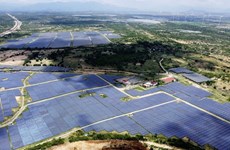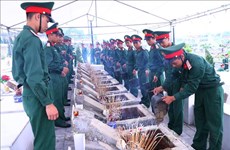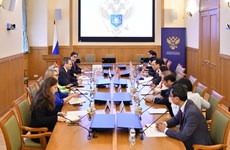Symposium reflects on work of war correspondents
A symposium on the work of war correspondents was held at the Vietnam
News Agency (VNA)’s headquarters in Hanoi on April 24, with the
participation of many journalists who once reported on battlefields
across the country.
A symposium on the work of war correspondents was held at the Vietnam
News Agency (VNA)’s headquarters in Hanoi on April 24, with the
participation of many journalists who once reported on battlefields
across the country.
VNA General Director Nguyen Duc Loi said more than 400 Vietnamese correspondents had laid down their lives on the battleground. The VNA alone had 260 reporters and technical staff who died covering the war and hundreds of others suffered from war injuries.
VNA war reporters had covered all major battlefields throughout the resistance wars against France and the US, he said, stressing that they were both journalists and soldiers at the same time.
“They risked their lives to accurately report the war and strengthen the confidence of all Vietnamese soldiers and people that we would fight to the end for national independence,” the General Director said.
At the function, Vietnamese and foreign journalists shared their experience in reporting war-related news, recounted their time serving as war correspondents, and expressed their views on the past wars.
Former VNA General Director Tran Mai Huong, himself a war correspondent, said Vietnamese war correspondents had to report using antiquated equipment and sometimes, it could take several days to walk back to their offices and process their photos under US bombing.
Duong Duc Quang, a former VNA war correspondent, said working on the battlefield, the motto of him and his colleagues was always true reporting, and they were always standing side by side with the fighting soldiers in order to reflect the real situation of the war.
Participants at the forum also spoke highly of the role of international correspondents, noting their impartial report helped the global public have a correct view on the wars in Vietnam, thus supporting the Vietnamese people’s struggle for independence.
The forum was part of a series of seminars on journalism on war topics organised by the Vietnam Journalists Association, the VNA, the Academy of Journalism and Communications, the Quan doi Nhan dan (People’s Army) newspaper, and the military-run Viettel television.-VNA
VNA General Director Nguyen Duc Loi said more than 400 Vietnamese correspondents had laid down their lives on the battleground. The VNA alone had 260 reporters and technical staff who died covering the war and hundreds of others suffered from war injuries.
VNA war reporters had covered all major battlefields throughout the resistance wars against France and the US, he said, stressing that they were both journalists and soldiers at the same time.
“They risked their lives to accurately report the war and strengthen the confidence of all Vietnamese soldiers and people that we would fight to the end for national independence,” the General Director said.
At the function, Vietnamese and foreign journalists shared their experience in reporting war-related news, recounted their time serving as war correspondents, and expressed their views on the past wars.
Former VNA General Director Tran Mai Huong, himself a war correspondent, said Vietnamese war correspondents had to report using antiquated equipment and sometimes, it could take several days to walk back to their offices and process their photos under US bombing.
Duong Duc Quang, a former VNA war correspondent, said working on the battlefield, the motto of him and his colleagues was always true reporting, and they were always standing side by side with the fighting soldiers in order to reflect the real situation of the war.
Participants at the forum also spoke highly of the role of international correspondents, noting their impartial report helped the global public have a correct view on the wars in Vietnam, thus supporting the Vietnamese people’s struggle for independence.
The forum was part of a series of seminars on journalism on war topics organised by the Vietnam Journalists Association, the VNA, the Academy of Journalism and Communications, the Quan doi Nhan dan (People’s Army) newspaper, and the military-run Viettel television.-VNA













